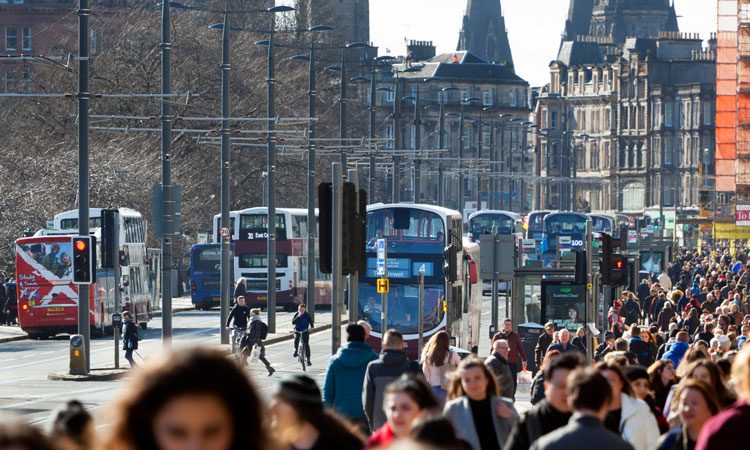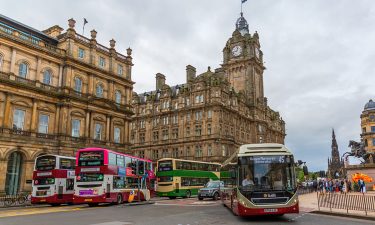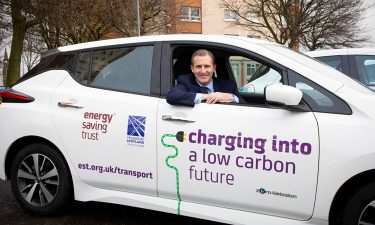How Scotland is moving to sustainable public transport
- Like
- Digg
- Del
- Tumblr
- VKontakte
- Buffer
- Love This
- Odnoklassniki
- Meneame
- Blogger
- Amazon
- Yahoo Mail
- Gmail
- AOL
- Newsvine
- HackerNews
- Evernote
- MySpace
- Mail.ru
- Viadeo
- Line
- Comments
- Yummly
- SMS
- Viber
- Telegram
- Subscribe
- Skype
- Facebook Messenger
- Kakao
- LiveJournal
- Yammer
- Edgar
- Fintel
- Mix
- Instapaper
- Copy Link
Posted: 13 August 2019 | Michael Matheson - Cabinet Secretary for Transport Infrastructure and Connectivity | No comments yet
Michael Matheson, Cabinet Secretary for Transport, Infrastructure and Connectivity, discusses how Scotland is supporting new transport initiatives to combat climate change.


For our climate, our air quality and for our health and wellbeing, a transition away from single-occupancy car travel to more sustainable forms of walking, cycling, public and shared transport options is essential in meeting our climate objectives.
At the same time, decarbonisation and the global transition towards electric and shared mobility options provides real opportunities for sustainable economic growth. I am confident that Scotland will position itself to take advantage of the ongoing innovations in electric propulsion and data science for the benefit of public and private transport, people and communities.
Reducing emissions and taking action
In light of the global climate emergency, we confirmed that the Scottish Government, including Transport Scotland, would look across a whole range of responsibilities to make sure that we continue with the policies that are underway to reduce emissions and, where necessary, take additional actions.


The Scottish Green Bus Fund is helping to evolve and modernise Scotland’s bus fleet.
Our existing plans for transport will see the greatest emissions reduction, in absolute terms, of any sector over the lifetime of the Climate Change Plan. However, this government acknowledges that further action to decarbonise transport is required to meet our new climate change targets.
We spend over £1 billion a year on sustainable public transport. This is used to subsidise bus fares, provide for concessionary travel and support the bus industry through the Scottish Green Bus Fund – which is helping to evolve and modernise our bus fleet. In addition, we have also provided funding for bus retrofit technology to ensure that bus companies can prepare for the introduction of Low Emission Zones (LEZs).
In 2017, this government made a bold commitment to protect public health by taking steps to establish LEZs in Scotland’s four biggest cities by the end of 2020. LEZs restrict access to the dirtiest vehicles in order to improve air quality and make our towns and cities cleaner places in which to live, work and visit.
Coupled with these measures are the provisions contained within the Transport Bill to enable Workplace Parking Levies. Similar to LEZs, the Transport Bill would give local authorities the power to take steps to implement a parking levy to encourage more sustainable transportation modes.
Improving Scotland’s public transport by supporting new initiatives
The Transport Bill also supports our smart ticketing ambitions by strengthening compatible smart ticketing technology across operators and modes, and will set in place an advisory body to best support Scotland-wide smart ticketing between operators and transport types. This will enable easier and more convenient sustainable travel choices across Scotland.
Similarly, Transport Scotland has launched the Mobility as a Service (MaaS) Innovation Investment Fund which aims to encourage people out of private cars and onto our sustainable public transport network.
Through providing better and more comprehensive travel information, powered by advances in data science, more people can feel empowered to use alternative and greener modes of transport with increased convenience. MaaS solutions have the potential to directly contribute towards a positive shift in how people view and engage with public and shared travel options.
I’m proud that through this government, a total of £2 million in funding is available over the next three years to grow the evidence base for new and innovative approaches.
We speak about a renaissance in rail here in Scotland, and with good reason. The number of rail journeys made continues to increase and we have a successful rolling programme of rail electrification in Scotland, meaning that by the end of 2019 three quarters of all ScotRail journeys will be under electric traction, helping to reduce our carbon emissions.
We are also progressing work to improve rail services on the Highland Mainline. During March 2019, the £55 million second phase of the Highland Mainline Enhancements programme was completed as scheduled, providing an immediate performance and resilience enhancement onto the route. By May 2020, a revised timetable, currently under development, will deliver journey time reductions and improve service frequency, providing better connectivity with the central belt and Inverness.
Staying active
We want to develop an Active Nation here in Scotland, where more people can choose to walk and cycle than ever before.
Last year we doubled the active travel budget from £39 million to £80 million and we have maintained this record funding again this year to increase the speed of change in the number of people choosing to walk and cycle.
With match funding from local authorities and other grantees, the total estimated spend was £135 million.
Funding of £51 million has been allocated for high quality walking and cycling infrastructure in 2019-2020 and in addition £13.5 million is being provided, supported by European Regional Development Funding, to provide active travel and low carbon vehicle hubs right across the country.
But what about cars?
Of course, for many people and particularly in our rural areas, cars remain the most convenient mode of travel. We recognise this, but we also need to balance our transport needs alongside our responsibility to protect public health and our environment. In addition to LEZs, this government has set out a bold ambition to phase out the need for new petrol and diesel cars and vans by 2032.
To support this, we have invested almost £30 million since 2012 to establish one of the most comprehensive electric vehicle charging networks in Europe. We now have close to 1000 chargers and the average distance from any given location to the nearest public charge point is 2.8 miles in Scotland, lower than the UK average of 4.1 miles.


Mr Matheson behind the wheel of a zero-emission vehicle at the launch of the Plugged-In Households initiative which provides affordable access to modern ultra-low emission vehicles.
To help people and businesses make the switch, we increased our Low Carbon Transport Loan Fund from £8 million to £20 million – which provides interest-free loans to help finance the purchase of ultra-low emission vehicles. I’m proud that we are leading from the front, with funding supporting over 1000 electric vehicles into Scotland’s public sector fleet.
This said, in isolation, simply encouraging more electric vehicles onto our roads will not solve our transport challenges. We need to shake-up perceptions around car ownership and our innovative Plugged-in Households initiative does just that. We are funding housing associations to procure the services of electric vehicle car clubs. This provides affordable access to modern ultra-low emission vehicles and enables viable alternatives to car ownership in our communities.
Encouraging innovation
These actions are just the beginning and we are committing substantial resources to increasing innovation activity and support, aimed at accelerating the development of new approaches to decarbonising transport.
We have existing policies which support decarbonisation with ambitious proposals still to be announced.
However, we also need to consider our future approaches to realise the sustainable vision for transport we hope to achieve.
A new National Transport Strategy (NTS2) for Scotland has been published marking a step-change in our approach to transport for the next 20 years. Our strategy, which aims to protect our climate and improve the quality of our lives, details how the transport system will deliver better outcomes for people and businesses by promoting equality, taking climate action, helping our economy prosper and improving our health and well-being.
We all have a stake in our transport system as we choose how we want to travel and so I am encouraging everyone who has an interest to consider the new Strategy and to join our conversation. Together, we can ensure our system reflects the needs of communities and businesses, supports sustainable economic growth and meets our urgent and continued need to protect our air quality and our climate.
Biography
Michael Matheson was a Regional MSP for Central Scotland from 1999 to 2007 and was elected as the MSP for Falkirk West following the May 2007 elections. Before being appointed Minister for Public Health and Sport from 2011-2014, Mr Matheson was Vice Convenor of the European and External Relations Committee. He was appointed Cabinet Secretary for Justice in November 2014 and reappointed in May 2016. Michael Matheson was appointed Cabinet Secretary for Transport, Infrastructure and Connectivity in June 2018.
Related topics
Infrastructure & Urban Planning, Mobility Services, Multimodality, Public Transport, Sustainable Urban Transport, Ticketing & Payments, Transport Governance & Policy
Related cities
Scotland
Related organisations
Scottish Government
Related people
Michael Matheson








